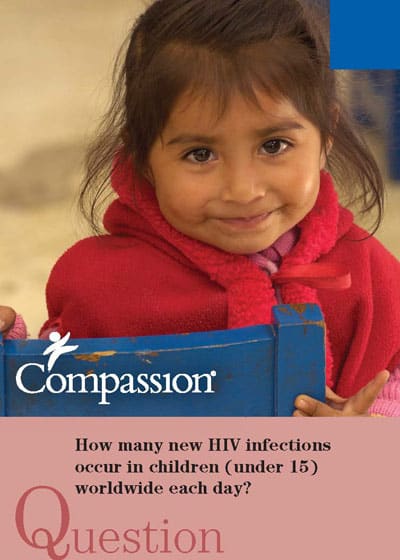Here’s question four in our lead-up to World AIDS Day on Dec. 1.

Remember when you answer each day’s HIV/AIDS question correctly, you are eligible to win a free CD – your choice of either Portable Sounds by tobyMac or Beyond Measure by Jeremy Camp. We’ll randomly choose a winner each day from the correct answers.
The answer to Wednesday’s question is yes; a person with AIDS always has HIV.
HIV is the virus that causes AIDS.
A person may have HIV for many years without developing AIDS. An HIV-positive person is considered to have AIDS only when his or her white blood cell (CD4) count drops below the 200-350 range. In fact, until then, a person with HIV may not show symptoms of the infection.
However, an HIV-infected person is still able to transmit the disease to others and may develop AIDS at any time.







7 Comments |Add a comment
The correct answer is 1,000, and the CD winner is Elizabeth Marley, via Facebook.
During 2007, an average of 1,000 children worldwide became infected each day with HIV, the vast majority of them newborns.
Many people living in poverty are never tested and are unaware of their HIV positive status, thus increasing the rate of transmission.
An important focus of our AIDS Initiative is the prevention of mother-to-child transmission.
Source: 2008 Report on the Global AIDS Epidemic Executive Summary, pg.8
1014 per day (370,000 in 2007 divided by 365)
I’m guessing 1200 new cases/day
I’m going to say 1,300
There are 370,000 new cases in children under the age of 15 every year.
1,000 new case a day
Approx. 1,400 per day